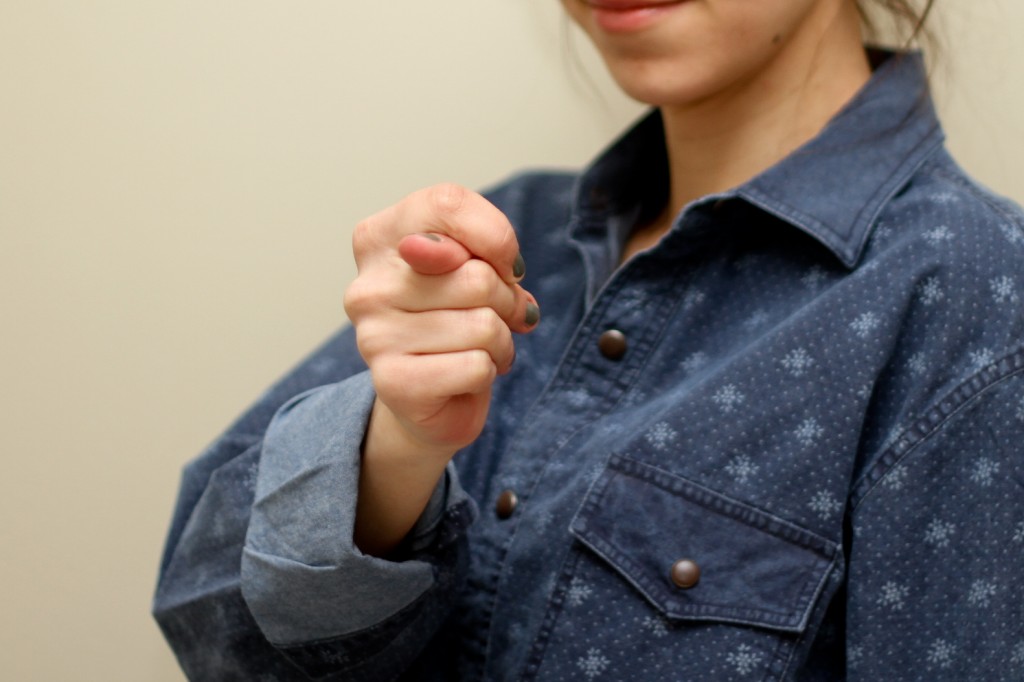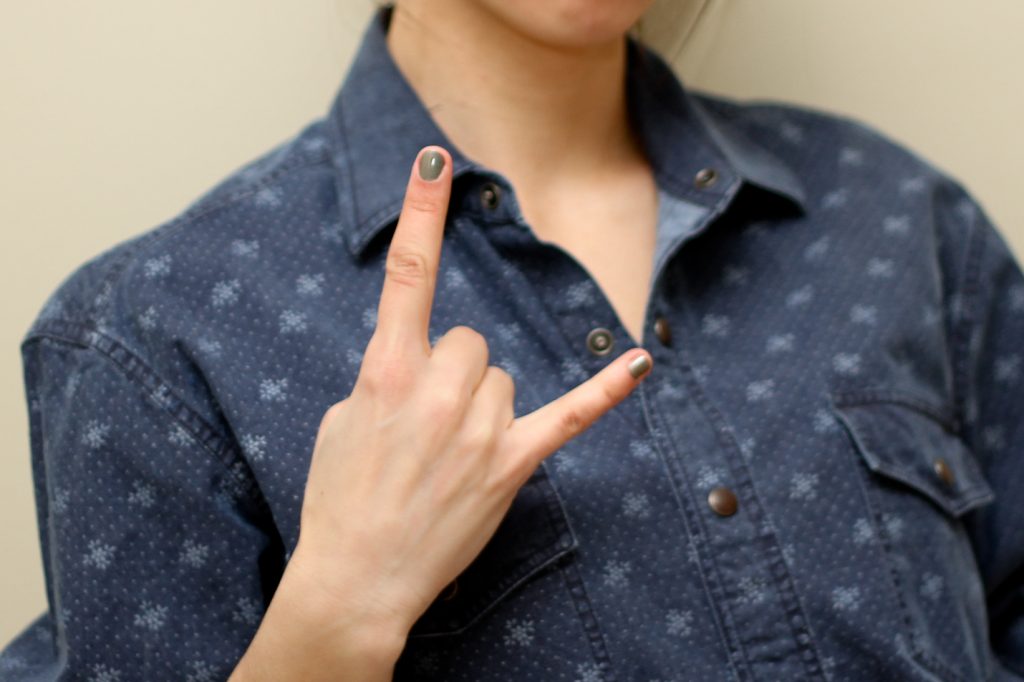5 Most Common Russian Gestures Posted by Jenya on Mar 25, 2014 in Culture, History, Russian life
When you are lost for words, especially if we are talking about foreign words, it is pretty common to resort to gestures. With this in mind, I thought it wouldn’t be a bad idea to shed some light on the most common Russian gestures. The information on their origin seems to be pretty conflicting. However, the meaning of these gestures is pretty well established. The article that I decided to use as the main reference point provides a pretty good collection of urban myths on the subject as well as a professional opinion: Yulia Nikolaeva, Professor of Linguistics at Moscow State University, tries to refute or confirm the popular myths.
Кукиш, also фига, дуля or шиш (thumb tucked in between your index and middle finger)
This gesture is quite popular in Russia. The most common version is that it was introduced to the Russians by the German expats. The German language has a popular saying “fick-fick machen” which means “having sex.” This gesture was used by Germans in an attempt to seduce Russian women. Russian women adopted the gesture, but with the exact opposite meaning; by using this gesture they were conveying that you get no sex. Over time the gesture became very common. Modern meaning implies “you get nothing,” whatever it is you are asking for. Nikolaeva seems to agree with this version.
“Коза”– sign of the horns (index finger and little finger pointing up)
This gesture existed in the Russian culture for centuries. The most common version says that originally the symbol was used for protection against evil spirits. In the last few decades, “new Russians” (a cliché used to describe rich Russians who rapidly accumulated their wealth through mostly questionable means) gave the gesture a new meaning; if someone is trying to look successful and cool, they might utilize this gesture to communicate the idea that they are “all that and a bag of chips.”
Another group of people who are fond of using this gesture in Russia are the rock/metal music followers. In this case the gesture carries pretty much the same meaning it has in the US and Western Europe, which is…? My point exactly! Nobody can clearly define what it means anymore. According to popular belief, the gesture was introduced to the metal world by Ronnie James Dio after he joined Black Sabbath.
Бить себя кулаком в грудь (to hit yourself in the chest with your fist)
One of the versions of this gesture’s origin goes back to the times of Mongol-Tatar Yoke. Supposedly, the nomads expressed their loyalty to their lords by hitting themselves in the chest. Nikolaeva doubts accuracy of this theory referring to the fact that the French also utilize this gesture. Contemporary meaning of this Russian gesture is pretty much the same: by hitting yourself in the chest you express loyalty to a person, vouch for accuracy of yours or someone else’s words, swear that you are telling the truth or promise to deliver. Interestingly enough, I have noticed the presence of a similar gesture in hip-hop culture. I wonder if there is any connection between the two?
Рвать на груди рубаху (to rip your shirt open)
According to popular belief, this gesture stems from the desire to show the cross as a symbol of Christian faith. The reason behind showing the cross is to communicate honesty and sincerity, somewhat like saying “I swear to God!” Yulia Nikolaeva seems to support this version.
Щелчок по шее (a flick on the neck)
The origin of this gesture is, perhaps, the most controversial. The most common belief is that it appeared in times of Peter the Great. Supposedly, there was a very talented carpenter or some other sort of craftsman who did some very impressive work for Peter I. In return Peter gave him a letter of privilege, which allowed him to drink free of charge anywhere for the rest of his life. At some point, the craftsman lost the letter; to keep the privilege in effect, he was branded by czar’s officials (on the side of his neck) . Upon entering a bar, the guy would flick himself on the brand, which meant that he is entitled to drink for free. In today’s Russia, everyone knows that a flick on the throat is an invitation to drink.
«Джентельмены удачи» (Gentlemen of Good Luck) is a classic Russian comedy that happens to show most of the described gestures in action. Give it a try!
Всего хорошего!

Build vocabulary, practice pronunciation, and more with Transparent Language Online. Available anytime, anywhere, on any device.









Comments:
Bob:
Interesting history of Кукиш. The meaning of this gesture has been a point of disagreement between my wife (who’s from Crimea) and myself. Her position is the same as here in the article. Mine – not so much 🙂
A few years ago, I was listening to a podcast lecture on the history of Russia, done by a professor from (I think) Indiana University. In the lecture on the liberation of the serfs, he relates a story of a female serf, who, upon learning of her freedom, leaves the plantation where she was working. Her last act before leaving was to face the house of her former lord/master and make the Кукиш sign. Since then, I’ve equated this sign with the American use of the middle finger.
Jenya:
@Bob Thank you for sharing Bob!
Very interesting story. I have not come across this one before 🙂 We’ll probably never know for sure how these gestures came about, but it is certainly amusing to comb through all the versions that are available 🙂
Steve:
I think it’s “Fick-fick machen” (or simply Fick machen) not what you have. Or you can simply use the verb ficken,
http://de.wikipedia.org/wiki/Ficken
The Wikipedia page you linked to transliterates it thus, without the “Л”:
«фик-фик махен» («fick-fick machen»),
Jenya:
Steve, you are correct! My German is not quite as good as my English 🙂
Nils:
Also, as far as I understand, the Кукиш sign (or a slight variation thereof) is sometimes used in Turkey. The meaning there is more like the good ole’ raised middle finger.
Rommel:
Thank you for this. I am venezuelan but always loved Russia and always interested in russian stuff. I’ve become more familiar with its customs through russian friends and the russian wife of one of my venezuelan friends. You will be suprised on how similar is our sense of humor and drinking customs. 🙂
Jenya:
@Rommel Thank you Rommel,
I would love to visit Venezuela one day. It is nice to know that we have some things in common with your people :-).
Cristiano Steffens:
Thank you for this interesting piece about the Russian culture. I’m from Brazil and except by the “flick on the neck” we have all these gestures here with these same meanings. Anyway I never searched for their origins. From now on I’ll use that invitation to drink )
Jenya:
@Cristiano Steffens Thank you everyone for the feedback! Nice to know learn about the similarities in other cultures!
Benjamin:
What a great article! I lived in Russia and Belarus for about 3 years and until now never got such a clear explanation of the figa – and was completely clueless as to the other gestures aside from “flicking the neck”. Thank you!
Is this the only site you write for?
Laura:
The term “fick fick machen” does not exist in German language at all. It doesn’t mean anything nor does it make sense. However, we have the verb “ficken”, which is pretty vulgar though and simply means to “f***”.
Chris:
q. Saw this gesture in as movie (Eastern Promises). What does two fingers jabbed in the neck mean? (index and middle finger)
Syl:
Hello Jenya, Do young Russians today know, or ever do the “two fingered V sign”. The reverse “peace sign”, which in Britain and American means contempt?
Dory:
I am surprised no one helped you out with the “sign of the horns.” It is very common in the U.S. and all English-speaking countries. It is known as the “metal salute.” It references it’s frequent use in heavy metal music. Why?
It is the Sign of the Beast! In making this gesture, your hand is making the horns of the Devil (which any metal fan will tell you, Satan is AWESOME). You are also making three number “6” shapes with your fingers. 6-6-6. Get it? Black Sabbath…Satan… metal music loves those kinds of symbols. It has really lost any true Satanic references, and now just means “you rock!”
So metal salute your friends whenever you want to tell them you think something is awesome, especially any hard rocking music. But you probably don’t want to use this gesture around any conservative Christians. They’re kinda uptight about this one.
David M. Delo:
Hi. I am an author writing a book about a woman photographer who went to Russia in the early 1930s to photograph the results of Russia’s Five Year Plan.
I need to know what gesture means “No” or “Forget it” or I won’t do it.”
thanks. DMD
Emily Charmaine Evans:
I’m Deaf and use American Sign Language. It’s very interesting to see Sign from “hearing” and another country! But the pulling of the shirt to open–I thought that was an aggressive sign, like, the gorilla pounding his chest or saying “I’m an alpha male–see the hair on my chest?” LOL.